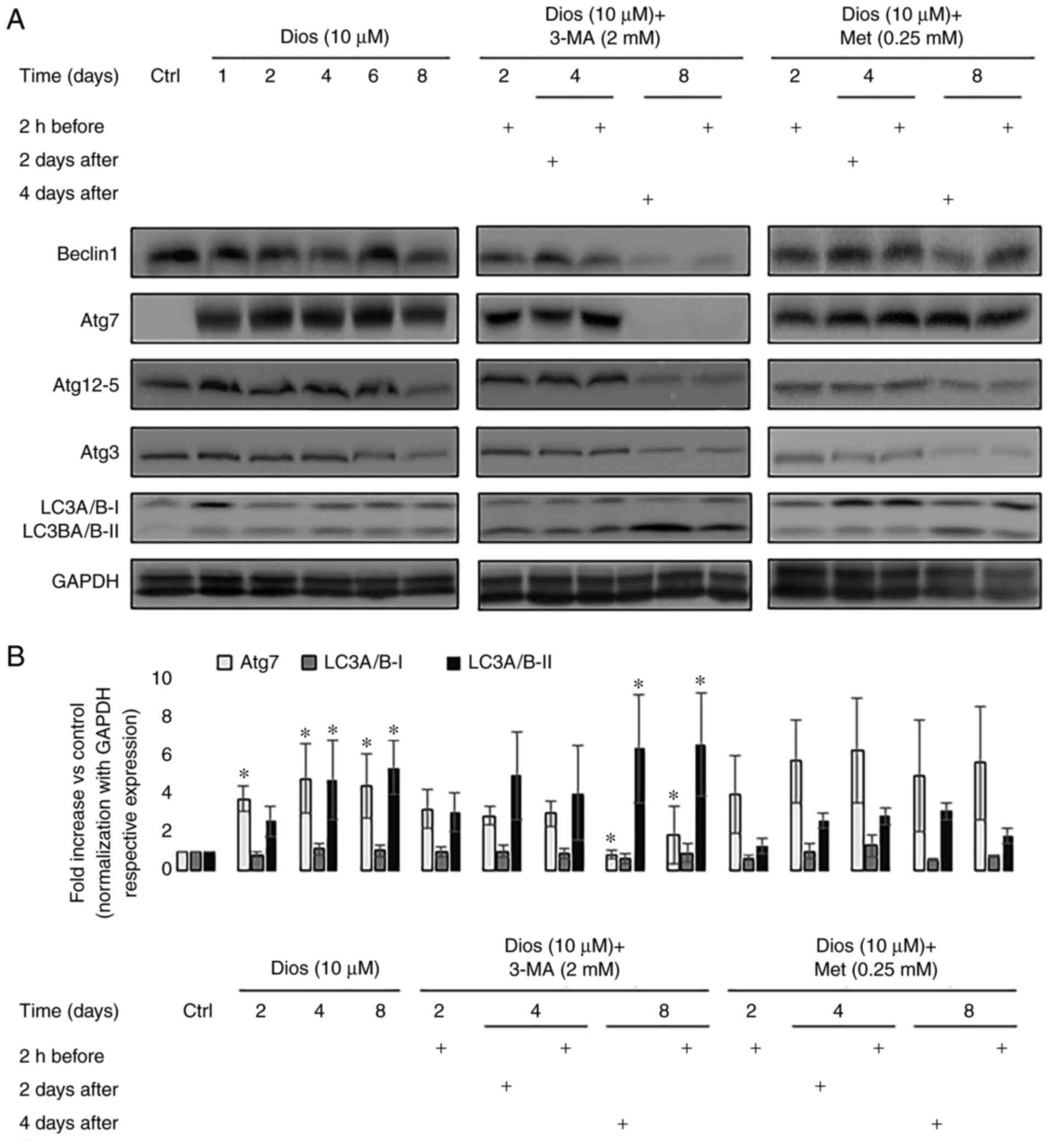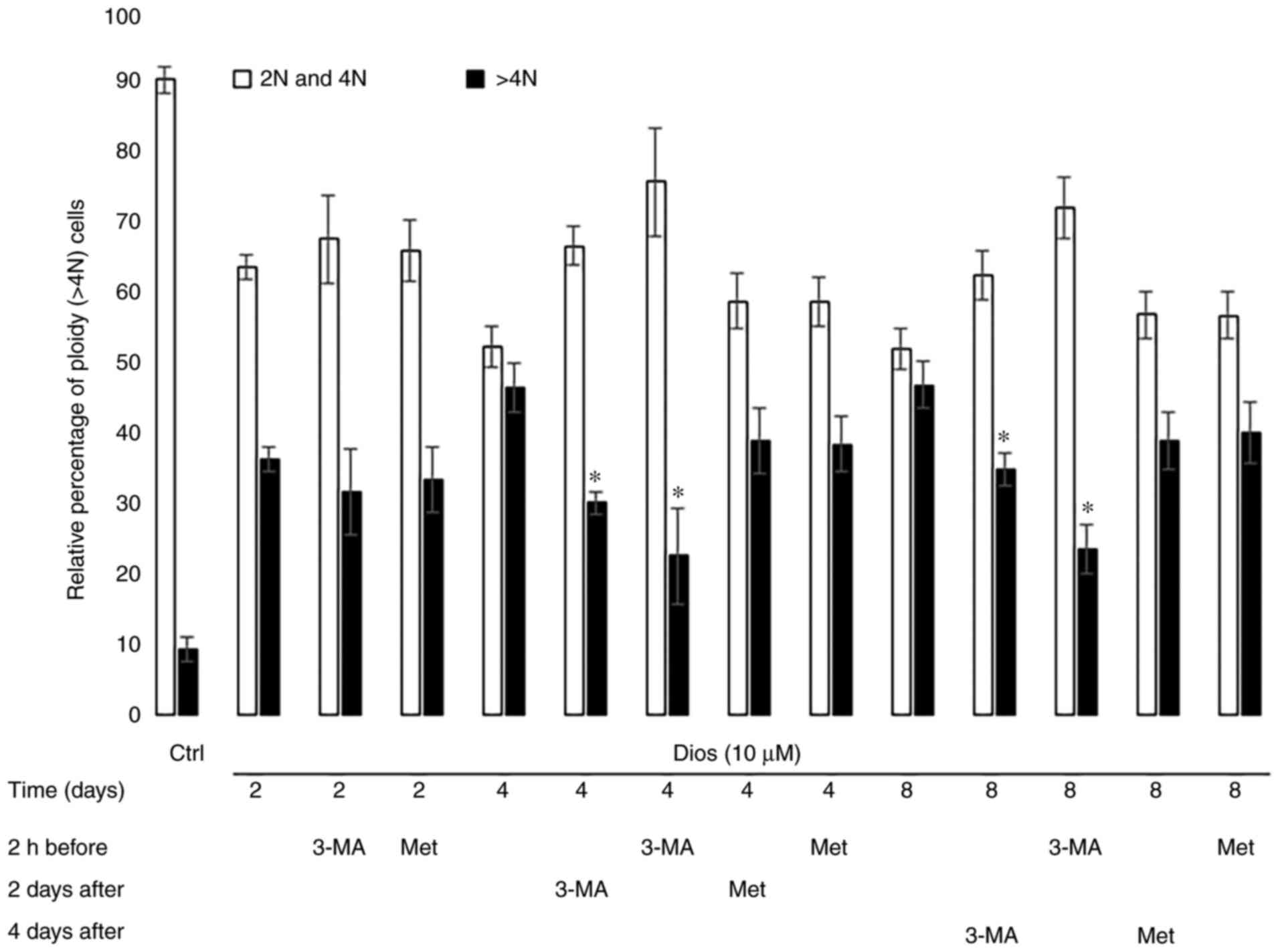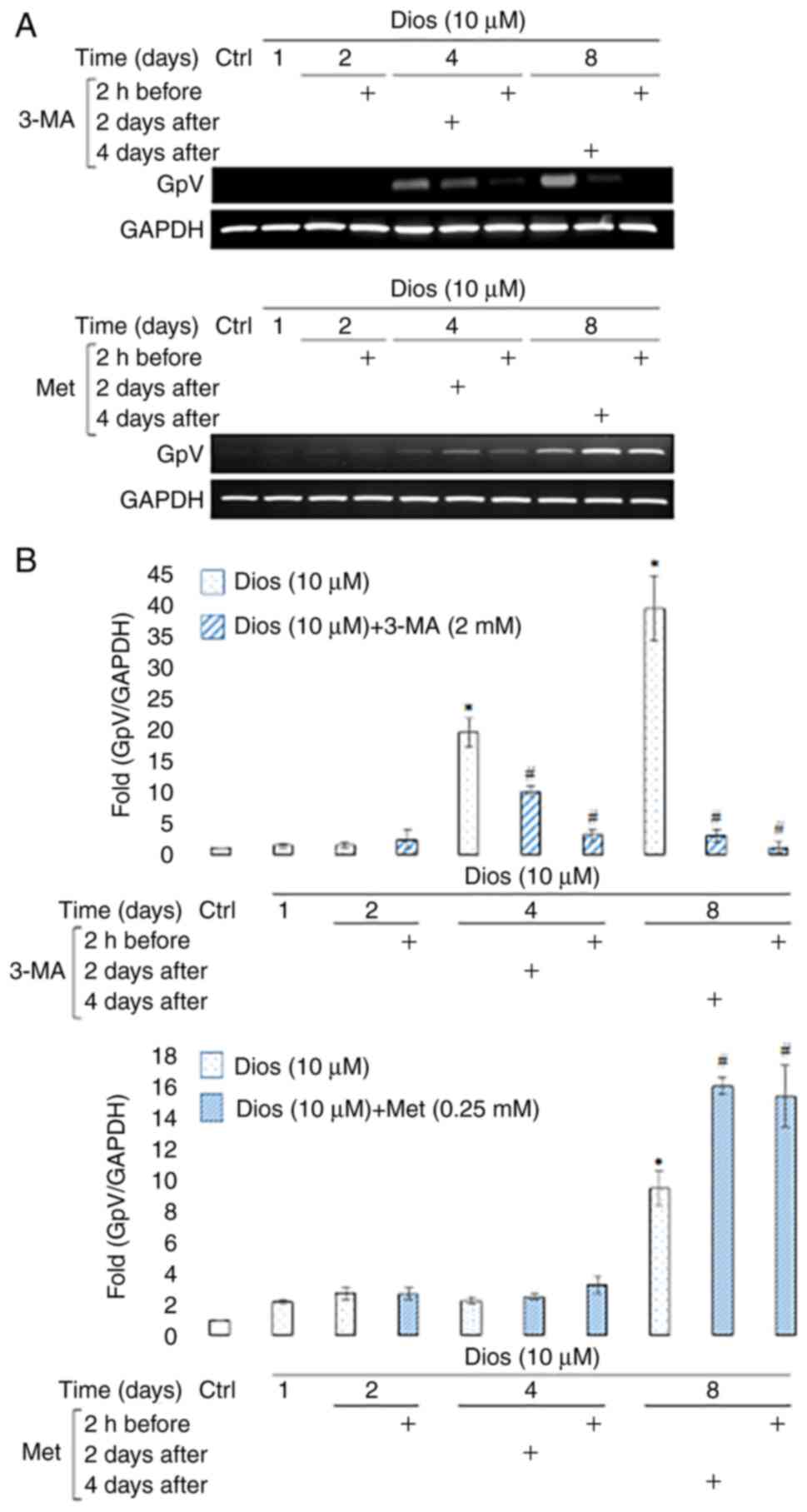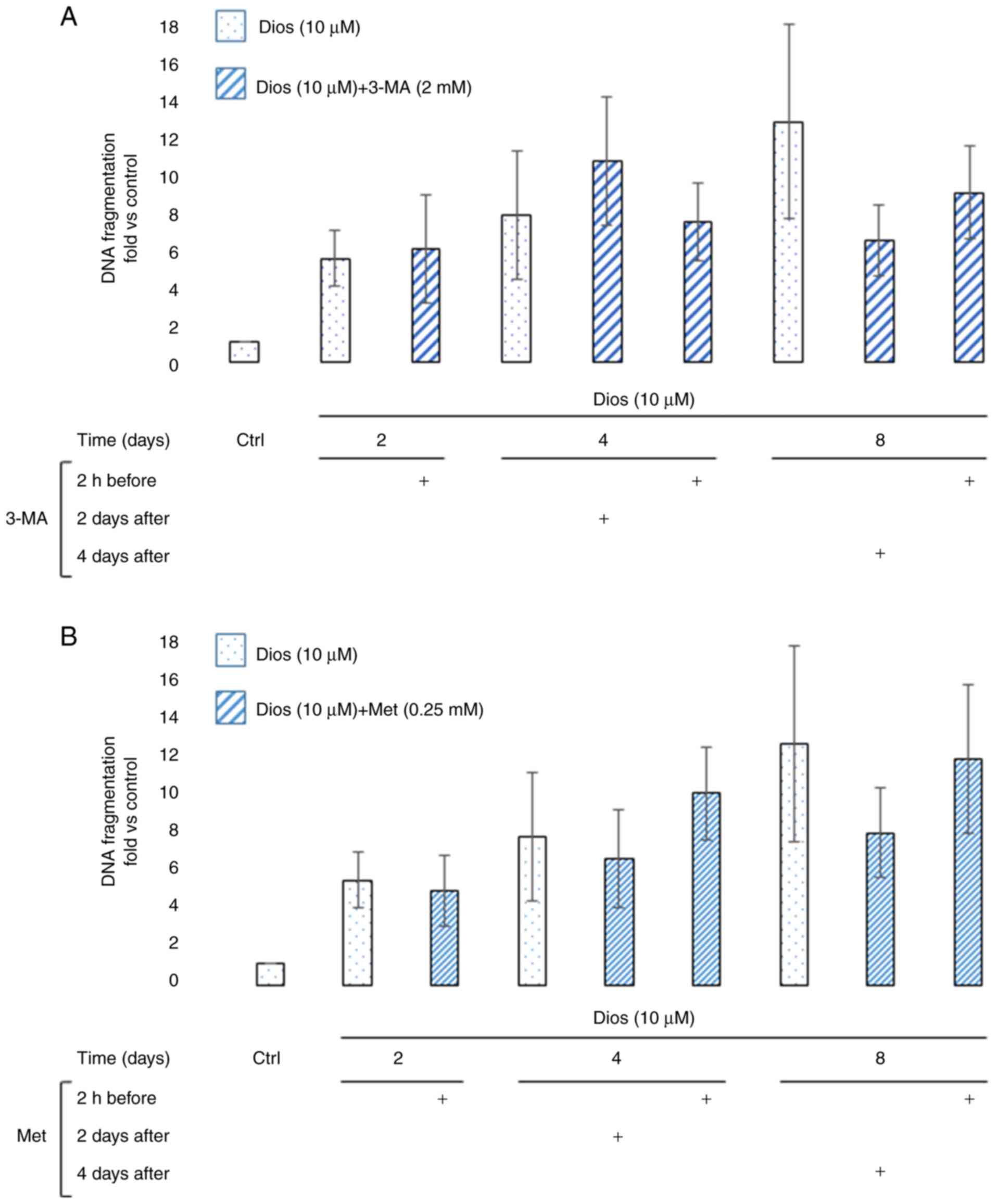|
1
|
Sell S: Leukemia: Stem cells, maturation
arrest, and differentiation therapy. Stem Cell Rev. 1:197–205.
2005. View Article : Google Scholar : PubMed/NCBI
|
|
2
|
Nowak D, Stewart D and Koeffler HP:
Differentiation therapy of leukemia: 3 decades of development.
Blood. 113:3655–3665. 2009. View Article : Google Scholar : PubMed/NCBI
|
|
3
|
Gocek E and Marcinkowska E:
Differentiation therapy of acute myeloid leukemia. Cancers (Basel).
3:2402–2420. 2011. View Article : Google Scholar : PubMed/NCBI
|
|
4
|
Yang J, Qiu J, Hu Y, Zhang Y, Chen L, Long
Q, Chen J, Song J, Rao Q, Li Y, et al: A natural small molecule
induces megakaryocytic differentiation and suppresses
leukemogenesis through activation of PKCδ/ERK1/2 signaling pathway
in erythroleukemia cells. Biomed Pharmacother. 118:1092652019.
View Article : Google Scholar : PubMed/NCBI
|
|
5
|
Gao X, Wu J, Zou W and Dai Y: Two ellagic
acids isolated from roots of Sanguisorba officinalis L. promote
hematopoietic progenitor cell proliferation and megakaryocyte
differentiation. Molecules. 19:5448–5458. 2014. View Article : Google Scholar : PubMed/NCBI
|
|
6
|
Beneytout JL, Nappez C, Leboutet MJ and
Malinvaud G: A plant steroid, diosgenin, a new megakaryocytic
differentiation inducer of HEL cells. Biochem Biophys Res Commun.
207:398–404. 1995. View Article : Google Scholar : PubMed/NCBI
|
|
7
|
Léger D, Battu S, Liagre B, Cardot P and
Beneytout JL: Sedimentation field flow fractionation to study human
erythroleukemia cell megakaryocytic differentiation after short
period diosgenin induction. J Chromatogr A. 1157:309–320. 2007.
View Article : Google Scholar : PubMed/NCBI
|
|
8
|
Léger DY, Battu S, Liagre B, Beneytout JL
and Cardot PJP: Megakaryocyte cell sorting from
diosgenin-differentiated human erythroleukemia cells by
sedimentation field-flow fractionation. Anal Biochem. 355:19–28.
2006. View Article : Google Scholar : PubMed/NCBI
|
|
9
|
Leger D, Liagre B and Beneytout JL: Role
of MAPKs and NF-kappaB in diosgenin-induced megakaryocytic
differentiation and subsequent apoptosis in HEL cells. Int J Oncol.
28:201–207. 2006.PubMed/NCBI
|
|
10
|
Luff SA, Kao CY and Papoutsakis ET: Role
of p53 and transcription-independent p53-induced apoptosis in
shear-stimulated megakaryocytic maturation, particle generation,
and platelet biogenesis. PLoS One. 13:e02039912018. View Article : Google Scholar : PubMed/NCBI
|
|
11
|
Kovuru N, Raghuwanshi S, Sharma DS,
Dahariya S, Pallepati A and Gutti RK: Endoplasmic reticulum stress
induced apoptosis and caspase activation is mediated through
mitochondria during megakaryocyte differentiation. Mitochondrion.
50:115–120. 2020. View Article : Google Scholar : PubMed/NCBI
|
|
12
|
De Botton S, Sabri S, Daugas E, Zermati Y,
Guidotti JE, Hermine O, Kroemer G, Vainchenker W and Debili N:
Platelet formation is the consequence of caspase activation within
megakaryocytes. Blood. 100:1310–1317. 2002. View Article : Google Scholar : PubMed/NCBI
|
|
13
|
Solier S, Fontenay M, Vainchenker W, Droin
N and Solary E: Non-apoptotic functions of caspases in myeloid cell
differentiation. Cell Death Differ. 24:1337–1347. 2017. View Article : Google Scholar : PubMed/NCBI
|
|
14
|
Glick D, Barth S and Macleod KF:
Autophagy: Cellular and molecular mechanisms. J Pathol. 221:3–12.
2010. View Article : Google Scholar : PubMed/NCBI
|
|
15
|
Wesselborg S and Stork B: Autophagy signal
transduction by ATG proteins: From hierarchies to networks. Cell
Mol Life Sci. 72:4721–4757. 2015. View Article : Google Scholar : PubMed/NCBI
|
|
16
|
Wu YT, Tan HL, Shui G, Bauvy C, Huang Q,
Wenk MR, Ong CN, Codogno P and Shen HM: Dual role of
3-methyladenine in modulation of autophagy via different temporal
patterns of inhibition on class I and III phosphoinositide
3-kinase. J Biol Chem. 285:10850–10861. 2010. View Article : Google Scholar : PubMed/NCBI
|
|
17
|
Hawley SA, Gadalla AE, Olsen GS and Hardie
DG: The antidiabetic drug metformin activates the AMP-activated
protein kinase cascade via an adenine nucleotide-independent
mechanism. Diabetes. 51:2420–2425. 2002. View Article : Google Scholar : PubMed/NCBI
|
|
18
|
Colosetti P, Puissant A, Robert G, Luciano
F, Jacquel A, Gounon P, Cassuto JP and Auberger P: Autophagy is an
important event for megakaryocytic differentiation of the chronic
myelogenous leukemia K562 cell line. Autophagy. 5:1092–1098. 2009.
View Article : Google Scholar : PubMed/NCBI
|
|
19
|
Cao Y, Cai J, Li X, Fang Y, Zhang S, Yuan
N, Mao X and Wang J: Loss of autophagy leads to megakaryocytes
differentiation failure and defective platelets function. Blood.
124:41482014. View Article : Google Scholar
|
|
20
|
Wang Q, You T, Fan H, Wang Y, Chu T, Poncz
M and Zhu L: Rapamycin and bafilomycin A1 alter autophagy and
megakaryopoiesis. Platelets. 28:82–89. 2017. View Article : Google Scholar : PubMed/NCBI
|
|
21
|
Pinon A, Limami Y, Micallef L, Cook-Moreau
J, Liagre B, Delage C, Duval RE and Simon A: A novel form of
melanoma apoptosis resistance: Melanogenesis up-regulation in
apoptotic B16-F0 cells delays ursolic acid-triggered cell death.
Exp Cell Res. 317:1669–1676. 2011. View Article : Google Scholar : PubMed/NCBI
|
|
22
|
Léger D, Liagre B, Cardot P, Beneytout JL
and Battu S: Diosgenin dose-dependent apoptosis and differentiation
induction in human erythroleukemia cell line and sedimentation
field-flow fractionation monitoring. Anal Biochem. 335:267–278.
2004. View Article : Google Scholar : PubMed/NCBI
|
|
23
|
Bretin L, Pinon A, Bouramtane S, Ouk C,
Richard L, Perrin ML, Chaunavel A, Carrion C, Bregier F, Sol V, et
al: Photodynamic therapy activity of new porphyrin-xylan-coated
silica nanoparticles in human colorectal cancer. Cancers (Basel).
11:14742019. View Article : Google Scholar : PubMed/NCBI
|
|
24
|
Bertrand J, Liagre B, Ghezali L, Beneytout
JL and Leger DY: Cyclooxygenase-2 positively regulates Akt
signalling and enhances survival of erythroleukemia cells exposed
to anticancer agents. Apoptosis. 18:836–850. 2013. View Article : Google Scholar : PubMed/NCBI
|
|
25
|
Mazzi S, Lordier L, Debili N, Raslova H
and Vainchenker W: Megakaryocyte and polyploidization. Exp Hematol.
57:1–13. 2018. View Article : Google Scholar : PubMed/NCBI
|
|
26
|
Klobuch S, Steinberg T, Bruni E, Mirbeth
C, Heilmeier B, Ghibelli L, Herr W, Reichle A and Thomas S:
Biomodulatory treatment with azacitidine, all-trans retinoic acid
and pioglitazone induces differentiation of primary AML blasts into
neutrophil like cells capable of ROS production and phagocytosis.
Front Pharmacol. 9:13802018. View Article : Google Scholar : PubMed/NCBI
|
|
27
|
Ouseph MM, Huang Y, Banerjee M, Joshi S,
MacDonald L, Zhong Y, Liu H, Li X, Xiang B, Zhang G, et al:
Autophagy is induced upon platelet activation and is essential for
hemostasis and thrombosis. Blood. 126:1224–1233. 2015. View Article : Google Scholar : PubMed/NCBI
|
|
28
|
Ortega Aramburu JJ: Idiopathic
thrombocytopenic purpura-autoimmune thrombocytopenia in children.
An Esp Pediatr. 23:145–151. 1985.(In Spanish). PubMed/NCBI
|
|
29
|
Huang HL, Chen YC, Huang YC, Yang KC, Pan
HY, Shih SP and Chen YJ: Lapatinib induces autophagy, apoptosis and
megakaryocytic differentiation in chronic myelogenous leukemia K562
cells. PLoS One. 6:e290142011. View Article : Google Scholar : PubMed/NCBI
|
|
30
|
Raslova H, Baccini V, Loussaief L, Comba
B, Larghero J, Debili N and Vainchenker W: Mammalian target of
rapamycin (mTOR) regulates both proliferation of megakaryocyte
progenitors and late stages of megakaryocyte differentiation.
Blood. 107:2303–2310. 2006. View Article : Google Scholar : PubMed/NCBI
|
|
31
|
Drayer AL, Olthof SG and Vellenga E:
Mammalian target of rapamycin is required for
thrombopoietin-induced proliferation of megakaryocyte progenitors.
Stem Cells. 24:105–114. 2006. View Article : Google Scholar : PubMed/NCBI
|
|
32
|
Sun RJ, Yuan D, Liu SY, Zhu JJ and Shan
NN: Rapamycin induces megakaryocytic differentiation through
increasing autophagy in Dami cells. Blood Coagul Fibrinolysis.
31:310–316. 2020. View Article : Google Scholar : PubMed/NCBI
|
|
33
|
Takafuta T, Fujimura K, Kawano H, Noda M,
Fujimoto T, Oda K, Shimomura T and Kuramoto A: Expression of
platelet membrane glycoprotein V in human megakaryocytes and
megakaryocytic cell lines: A study using a novel monoclonal
antibody against GPV. Thromb Haemost. 72:762–769. 1994. View Article : Google Scholar : PubMed/NCBI
|
|
34
|
Liu ZJ, Italiano J Jr, Ferrer-Marin F,
Gutti R, Bailey M, Poterjoy B, Rimsza L and Sola-Visner M:
Developmental differences in megakaryocytopoiesis are associated
with up-regulated TPO signaling through mTOR and elevated GATA-1
levels in neonatal megakaryocytes. Blood. 117:4106–4117. 2011.
View Article : Google Scholar : PubMed/NCBI
|
|
35
|
Falcieri E, Bassini A, Pierpaoli S,
Luchetti F, Zamai L, Vitale M, Guidotti L and Zauli G:
Ultrastructural characterization of maturation, platelet release,
and senescence of human cultured megakaryocytes. Anat Rec.
258:90–99. 2000. View Article : Google Scholar : PubMed/NCBI
|
|
36
|
Vrbensky JR, Nazy I, Toltl LJ, Ross C,
Ivetic N, Smith JW, Kelton JG and Arnold DM: Megakaryocyte
apoptosis in immune thrombocytopenia. Platelets. 29:729–732. 2018.
View Article : Google Scholar : PubMed/NCBI
|


















